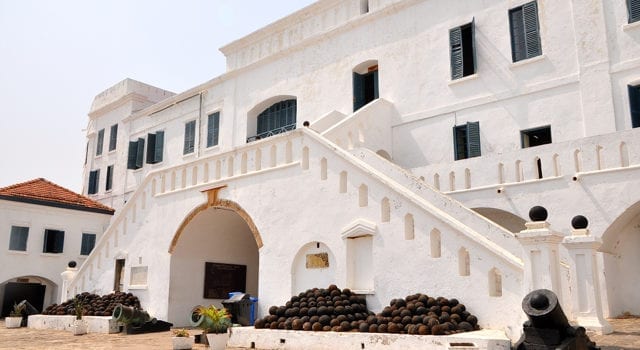CAPE COAST, GHANA — I was 5,300 miles from my home in Fayetteville. But I had read enough history to know that in one sense I was back at the beginning.
They cannot teach you in books how dark it can be in the tight, former slave dungeon that held a little over two dozen of us, people of many different backgrounds. We were tourists.
We knew we could leave at any time. A couple of people in our group shouted for the light as soon as it went out. The guide turned it on.
The thousands of enslaved Africans who had passed through this hard cell in Cape Coast Castle would have had no such luxury.
They had no voice at all, not one heeded by the slavers. Our young tour guide explained the men in that particular pen could stay there as long as 36 hours, virtually on top of each other, no hope of escape, no access to bathrooms, two meager meals a day. They were sprayed down not to cleanse them but to give them scant relief to the searing heat. And there was virtually no light, with windows too small and elevated to be of any use to the captives.
The guide told us the Church of England built a sanctuary above the slave dungeons. The enslaved Africans would hear the white Christians sing up above their heads. But no help was coming from up there.
The guide did not spare those African leaders who participated in selling other Africans, usually people from rival tribes. They knew full well the scope of what was happening at the castle, he told us.
After confinement at the castle, the enslaved Africans would be put on ships to sail for a lifetime of forced labor that was generational and for most would mean no prospect of freedom, ever. As bad as the cells were in the British-run castle, our guide said, the ship voyage was far worse. The mortality rate was high.
We explored the women’s dungeon, too, and the punishment room for women. The guide said there were twice as many men as women, and men who rebelled would simply be executed. But the slavers did not kill women. They were too valuable in this infernal market called the trans-Alantic slave trade.
[Hospitality, street vendors and ‘tro tros’ am
I was in Ghana with a small delegation to dedicate a rural church, the construction of which was partly funded by the church I attend, and where my wife serves as associate pastor, Camp Ground United Methodist Church off Skibo Road. The rest of the group comprised Sam Adu-Mireku from Camp Ground; Tom Greener, former Camp Ground pastor; and Bill Haddock, a pastor in Bunn and a mission interpreter for the North Carolina Conference of the United Methodist Church.
By coincidence, I had arrived in Ghana as its government is celebrating 2019 as a “Year of Return.” It marks the 400th anniversary of when slavery landed at Fort Comfort in Virginia, and is an open invitation for all of us in the African diaspora — the continent’s descendants — to visit Africa.
Our trip in Cape Coast and Accra, the capital, and a few points in between was suffused with the famous Ghanaian hospitality, which for me, intensified the feeling of being welcome, of being home. The spirit was even visible at the modern, efficient airport at Accra, where I found personnel to be friendly and inquisitive.
This hospitality is a source of pride, said Sam, who is a native of Ghana. Of course, I found it helpful that many people in Ghana, a former British colony, are fluent in English or passably so.
<span data-mce-type=” bookmark=””>
<span data-mce-type=” bookmark=””>
<span data-mce-type=” bookmark=””>
” data-gh-ad-remnant=”unknown” data-gh-gptadslots-id=”10″ data-google-query-id=”CPuhsqP–uQCFedgFQgdM-8Ifw”>
An illustration of the hospitality came in the person of the Rt. Rev. Paa Solomon Grant-Essilfie, the bishop of the diocese in Winneba, Ghana, which includes the new church. The church, or chapel as they call it, is located in a humble town named Ekumfi Takyiman, southwest of Accra along the coast.
Traditions
Grant-Essilfie was tapped to deliver the sermon at the dedication service, held last Sunday. We had driven about an hour-and-a-half through the countryside for a sit-down on the preceding Friday. The bishop met us in the parking lot. We went upstairs and after a bathroom break – they call them washrooms – we sat down for introductions and chit-chat.
Grant-Essilfie invited us to another room for lunch and apologized for not having offered the meal earlier. His wife had prepared the meal, which included some dishes with which I had already become familiar: Plantains, red beans, chicken and jollof rice, one of my favorite dishes while in Ghana because of the spicy flavor. The bishop helped served the meal and made sure everyone had theirs before he sat down to join us.
At the service, he delivered the sermon, alternating between English and Fante, a native language in that region. No one felt left out.
The worship service proceeded in colourful fashion. A marching band of youth greeted the worshippers outside before the ceremony. Flags inside were posted by children in the Boys’ Brigade and Girls Brigade’, all dressed in white and blue.
In the worship style at the chapel, I recognized traditions clearly imported into the African-American church in which I was raised. We left our seat to bring the offering around to the front. For the members at Takyiman, this was a time for dancing as the singing, keyboard, drums and horns hit a fever pitch. The service unfolded at “Baptist length” as well, somewhere around three hours.
Afterwards, we were served lunch in what I took to be a fellowship hall near the chapel. It turns out, we were in someone’s private home, which they had made available for us to use.
The weather in the tropical country was also hospitable when we were there. It was the rainy season, but we got a little rain. I surprised several Ghanaians when I told them the weather was about 10 degrees hotter back home in North Carolina. (This was before the cool snap that fell the day after I returned to the state on Wednesday.) Ghana gets crazy hot February through April, I’m told.
You cannot fully assess an entire country in a week, and I would not even try.
But I guess the strongest statement you could make about a place is that you want to go back, and I definitely want to return to Ghana one day with my family.
In the distant past, the heavy door on the Cape Coast that led to the ships on the Atlantic coast was called the Door of No Return.
“As they go down there that soil becomes the last soil they touch on the African continent,” our tour guide said. “Because the boats are there.”
But he added the chains of the Door of No Return were officially broken. The beach-facing side of the door is now called the Door of Return.
I am glad I walked through.
Columnist Myron B. Pitts can be reached at mpitts@fayobserver.com or 910-486-3559.


 Call Center
Call Center
